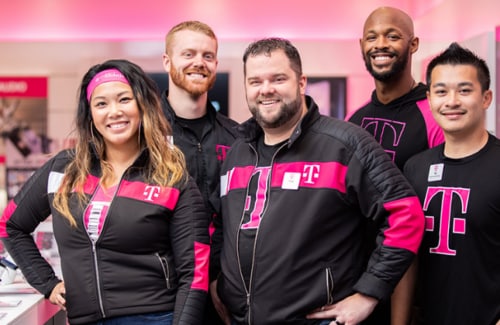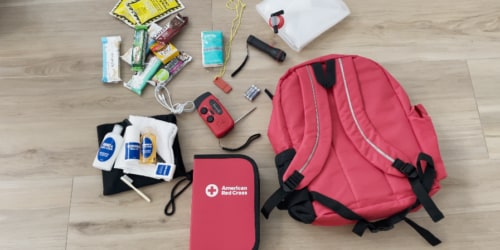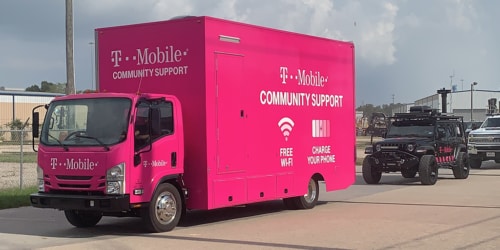This week, T-Mobile began its celebration of this year’s graduates by launching the #TossYourCap Challenge on TikTok with Grammy Award-winning artist DJ Khaled, Kesha, Dixie D’Amelio and other artists in support of Jobs for America’s Graduates, a national non-profit dedicated to serving youth and young adults with the aim of helping them graduate from high school and achieve success, as well as unveiling its Un-carrier Jobs Initiative — committing to hire more than 5,000 new employees over the next year.
Today, the magenta commendations continue as T-Mobile CEO Mike Sievert joins other impactful leaders and luminaries — including Apple CEO Tim Cook, Bill and Melinda Gates, Jimmy Fallon, Hillary Clinton and many more — through the company’s partnership with iHeartMedia and its “Commencement: Speeches for the Class of 2020” series. “The class of 2020 is uniquely poised for greatness as the first virtually graduating class,” says Sievert, “so we’re eager to partner with iHeartMedia and provide a few words of empowerment to give students a well-deserved celebration, in an equally unprecedented way.”
Following is the full text to Sievert’s speech, which offers inspiration and advice — above all, for this year’s graduates, and all of us, to follow our passions.
Hey, graduates. It’s Mike Sievert, CEO of T-Mobile.
I wanted to join the incredible list of people who’ve stopped by to congratulate all of you on the huge accomplishment of becoming a 2020 graduate — so congratulations.
I also wanted to let you know, I’ve been thinking about you. You know, we all have. Because I’m absolutely certain that this set of circumstances this year is not at all what you dreamt your graduation would look like — or what the world would look like when you received your diploma.
And frankly, it kind of sucks.
It’s certainly not fair. Not just because we’re in the middle of a global pandemic, and navigating something that most of us have only ever read about or maybe seen in movies. But because of the economic circumstances that you’re graduating into as a result of the pandemic.
But don’t let this environment diminish one ounce of what you’ve achieved. It took hard work and dedication and breaking through a lot of barriers to get here. You’ve earned it. And now you’re poised to launch into whatever’s next — whatever’s next for you.
And if you’re like most of us, the question you might be asking — and that probably absolutely everybody and their brother is asking you over and over and over again — right now is: “What’s next? What’s ahead? Where do we go from here?”
Well, like I said — first, take a deep breath. It’s going to be okay. Let what you’ve already accomplished sink in and then sit back and think about what fires you up.
You know, each of us has our own individual goals and dreams, and I think that all of us, myself included, we can’t go too wrong if we think about that old cliché we’ve all heard a million times, a cliché that might just apply now in this environment more than ever before:
Follow. Your. Passions.
Yeah, follow your passions. Okay, fine. You might be saying, “Well, how do I follow my passions when the world’s on lockdown, and everything after that is so uncertain?”
Well, that’d be a fair question. But I’m here to tell you that these circumstances — in fact, any circumstances like these, that create challenges or obstacles — really are opportunities. Opportunities that can become launchpads for resetting your mind or charting a new course or accomplishing what makes you and others happy.
In other words, for following your passions. I’ll come back to what I mean about all that in a minute, but first I want to tell you a little story. It actually involves one of my passions, one that gives me a much-needed mental reset from time to time. And that’s exploring the coastal waters of the Pacific Northwest with my family in our little boat.
And it happened while we were on a boat trip, returning from a place in coastal Canada called Desolation Sound. And yes, Desolation Sound is just as remote as it sounds. It’s a wilderness Island region near the mainland, and it’s beyond the end of the road. It’s a really beautiful place, but it’s far away. It takes hours and hours of cruising over the course of a couple of days to get there. Anyway, my family and I are cruising along in our boat, out at sea, miles from shore, as we’re heading back home to Seattle, Washington. And I had the boat on autopilot, on a leg that would last for several hours.
Now, like I said, we’re out at sea. I mean, you could see land in the distance, many miles away, but that’s only because the region is mountainous with snow-capped mountains and glaciers off in the distance. And I’m scanning around a bit with my binoculars, looking for errant logs or other obstacles that might get in the way while the autopilot’s doing its work.
And that’s when I see it. Off in the distance, off our port bow in the water. But it wasn’t a log. It was a man — a man alone in the water — and he’s alive.
In this one strange moment, I see him and he sees us, and he immediately rips off his life jacket and starts waving it in the air to make sure we don’t miss him, which briefly sends him under the waves. So I take the boat over from the autopilot, and I quickly maneuver the boat towards him. And the entire family kicks into motion to help him get out of the water.
Now, you have to understand, because we’re at sea, there are four-foot waves washing over the stern of our boat as we try to get this guy aboard. And, amazingly, it just so happened that the day before, the last day of our mini vacation, we’d actually been practicing man-overboard drills — how to rescue somebody from the water with this little sling that we’ve got.
So for the first time, and I hope for the last time ever, we really put those skills to work, and we managed to get this guy safely aboard. Everybody got wet, but he’s safe. He’s okay. We’re all fine.
And you want to know what the first thing he says to us is? I kid you not. He looks up at us and he says, “Hey, what’s up?” And it took me a minute, as I stood there and I’m thinking to myself, “Really? What’s up? Just minutes ago, you were stranded in the water with not long to live.” And all I could think to ask was, “Well, hey, how long you been in the water?” And he says, “I don’t know. What time is it?” And he points to a ruined old Timex watch on his wrist that’s been trashed during his unplanned swim.
So together we determine he’s been in the water for almost an hour — an hour. I mean, this is unbelievable. He’s got to have hypothermia. This guy has been in the water for an hour. And you have to understand, this is the Pacific Northwest. I mean, you don’t really swim in the ocean here. You might jump in once in a while — and then you get right back out.
But this guy’s been in the water for an hour.
So, we rush to wrap him up in one of those shiny thermal blankets that we have in our first aid kit. And he doesn’t even really seem that interested in it. Definitely no stress, no panic — maybe it was shock, I don’t know. And what’s really interesting is, after less than five minutes aboard with us, he turns and he suddenly asks, “Hey, have you seen my boat?”
And so now, instead of focusing on warming up, finding his boat becomes his next preoccupation. Not hypothermia. Not his health and safety. Not the fact that he was just rescued from the sea with no one in sight for miles around. Not that just five minutes ago, he was in this desperate life or death situation. No, he just wants to know where his boat is.
So we go up on the deck and begin scanning around with binoculars — and sure enough, there it is. His boat, just a couple miles off our bow. So, I decide to power up and get moving again, and eventually we get him to his boat.
Long story short, after 20 minutes or so with us, he’s warmed himself up and regained his senses. And then, amazingly, he actually boards his boat, and he’s off and running with nothing more than a friendly wave.
And, you know, as I lay in bed that night thinking all this through, I remember just thinking to myself, what was wrong with this guy? Why didn’t he seem to understand the gravity of this situation? And that today could have easily been his last.
And then it hit me — only then did I realize: Why didn’t I?
Why don’t we all think that way? I mean, with all my preoccupation around his misplaced sense of immortality, I should have been asking myself that same question. Not just why didn’t he understand how precious today really was, but why don’t we all? What would we do differently if making the most of each day really was our goal?
It may sound a little bit dramatic, but this thing hit me like a ton of bricks. Each day is precious, which means each day is a gift. We’re not guaranteed tomorrow. We might find ourselves adrift at sea, and it’s just a coin toss as to whether somebody just rando comes along and saves us. Saving that guy’s life, the crazy and random and unexpected and, frankly, somewhat scary set of circumstances I found myself in that day, helped to change and focus my perspective. Just as I hope graduating in this crazy, uncertain time will change or focus yours.
Today, right now, you’re smack dab in the middle of the most crazy and random and unexpected and, frankly, somewhat scary sense of circumstances yourselves. But it does beg the question of, What’s next? And if you let it, it can beg that question in the most positive of ways.
Many of you will pick different paths that never existed before this pandemic. Many of you will find completely new passions that show themselves to you during this very complicated time. And that leads me back to the cliché I mentioned earlier:
Follow. Your. Passions.
Go ahead. Really do it. Live your best life. As I said, every day is a gift, and that means that in the pursuit of our own happiness and the happiness we can spread to other people, we really can, and in a way we must, make the most of today, and never take tomorrow’s opportunities — or tomorrow’s worries — for granted.
I know that normalcy seems so far away right now, and everything around you is out of whack. But you know what? These temporarily uncertain circumstances are just that: temporary.
What will follow will be some new and different normal. But in any event, it will be a world that’s ready and waiting for you to make your impact.
So I hope you’ll go full-speed ahead into the things you’re passionate about, or try things that might just become passions. A good test of all this is whether or not these things are things that give you happiness and help you spread happiness to other people.
You know, the Dalai Lama himself says, “I believe the very purpose of life is to be happy.” I mean, he’s the Dalai Lama! And he’s got a good point there.
Listen, you’re experiencing the crazy and the random and the uncertain. You’ll likely change your perspective in many ways as a result of all this — we all will. You’ll reboot, reset, recharge — and now you’ll be ready to go full-steam ahead towards amazingness. And this world needs you to do exactly that.
So when everybody’s incessantly asking you, “What’s ahead?” First, take a deep breath. What’s behind you is a huge accomplishment. And second, follow the cliché — follow your passions. Find the things that make you happy and help you spread happiness to other people. Treat each day as something of value. The rest will fall in place.
And maybe, just maybe, you’ll be able to do it with the sunny disposition of that guy who came aboard our boat, wet and exhausted after an hour in the water, and looked up at us and simply said, “Hey, what’s up?”
So class of 2020, congratulations. Know that I’m with you. We’re all with you.
I’m Mike Sievert.
Thank you.




